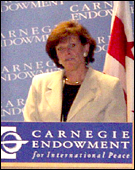Registration
You will receive an email confirming your registration.
Joining her:
Marina Ottaway, author of "Promoting Democracy in the Middle East: The Problem of U.S. Credibility" and coauthor of "Political Reconstruction in Iraq: A Reality Check"
Joseph Cirincione, director of the Non-Proliferation Project and coathor, with Jessica Mathews and George Perkovich, of Iraq: What Next? (PDF)
George Perkovich,
vice president for studies, will moderate.
See the range of Carnegie's Iraq resources by visiting www.ceip.org/iraq. The page includes links to the three Carnegie reports on Iraq, Iraq: A New Approach, Iraq: What Next?, From Victory to Success: Afterwar Policy in Iraq.
On September 30, 2003 , the Carnegie Endowment for International Peace held a briefing assessing the evolution of the reconstruction process in Iraq . Carnegie President Jessica Mathews discussed her impressions from her recent trip to Iraq, Senior Associate Marina Ottaway considered the prospects for successful political transition, and Senior Associate Joseph Cirincione discussed the issue of Iraq 's WMD capabilities. George Perkovitch, vice president for studies, moderated the session.
Jessica Mathews observed that her visit to Iraq has bolstered her argument that the solution to the Iraqi crisis is not military, but political. Aware of how the inherent limitations of a trip organized by the U.S. Department of Defense might have influenced her perceptions, she continued to examine the security and political tasks the U.S. government faces. She noted the persistent vulnerability of U.S. forces to low-tech, improvised explosive devices (IED), the difficulties regarding border control, the long-term effects of creating a “Muslim Framework” third multinational division, the questionable quality of the training received by future Iraqi forces, and the lack of significant progress in intelligence gathering. Among the complex political dilemmas the United States faces, she stressed the ethnic composition of Iraqi power structures, the level of political and military de-Ba'athification, the time-frame of constitution drafting, and the creation of a sense of ownership in the Iraqi population.
Marina Ottaway examined the problems the road map advanced by the U.S. administration presents for transferring sovereignty back to the Iraqi people. She observed that, contrary to the six-month period that the plan calls for to draft a constitution, hold democratic elections, and form a new government, achieving political consensus every step of the process takes time. She warned that rushing the political development of the country and imposing a prefabricated system from above would not adequately address complex issues such as the country's institutional framework and the nature of the Iraqi state. She noted that these issues need to be resolved by the Iraqi people if the system is to have any popular legitimacy. She regretted, however, that the process might be more influenced by the U.S. electoral calendar and the Iraqis' impatience than by real concerns over the future of a democratic Iraq .
Joseph Cirincione focused his remarks on the reliability of U.S. intelligence, and in particular, on the questionable objectivity of the Kay report and the National Intelligence Estimate (NIE). He noted that, despite the high expectations that the U.S. administration had built around David Kay's report on Iraq's WMD capabilities, Kay insists on negating what his investigation thus far seems to imply, namely, that Iraq has had no active WMD programs or weapons production since 1991. With respect to the NIE, Cirincione stressed the role that White House officials played in shaping the October 22 report, whose conclusions countered existing intelligence evidence. While further research needs to be done regarding Iraq 's WMD activities, these two cases constitute a serious dilemma to future reliability on U.S. intelligence and to the credibility of any U.S. administration, particularly when decisions based on intelligence information determine whether the country goes to war.
During the Q-and-A session, Cirincione responded to concerns over the use of intelligence evidence on future conflicts by advocating a multilateral approach of the sort that President George W. Bush is currently employing towards the Iranian nuclear crisis. Cirincione also addressed questions over intelligence gathering, suggesting that the U.S. government needs to have a clearly defined policy regarding the treatment of scientists who come forward with relevant information. He remarked that the confinement of leading Iraqi scientist Mahdi Obeidi in an undisclosed location does not set a positive precedent.
Ottaway commented on the role of the UN in smoothing the transition. She stated that, whereas UN intervention early in the process would have significantly shaped the political development in Iraq , only the announcement of an unambiguous plan for the country's reconstruction and transfer of power might return legitimacy to UN activities. Some U.S. military officials, Mathews added, have actually expressed their support for the UN as a way to ease Iraqis' feeling of occupation.
Finally, regarding the latest $87 billion proposal to Congress, both Mathews and Ottaway agreed on the need to reassess the projects on which money would be spent. They concurred that much of what the U.S. is focusing on can be achieved by the Iraqis themselves. In addition, by encouraging local economic development rather than uncontrolled foreign investment, the U.S. will also avoid Iraqis' excessive dependency on U.S. management.
Summary prepared by Silvia Manzanero, Junior Fellow with the Non-Proliferation Program at the Carnegie Endowment for International Peace
